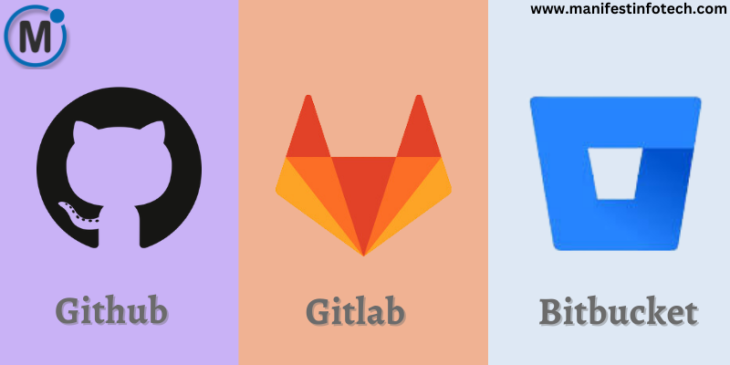
GitHub, GitLab, and Bitbucket are all web-based platforms for version control and collaborative software development using the Git version control system. Each of these platforms offers a range of features and tools to facilitate code management, collaboration, and continuous integration/continuous deployment (CI/CD) processes. Let’s compare these platforms in various aspects:
𝟏. 𝐆𝐢𝐭 𝐇𝐨𝐬𝐭𝐢𝐧𝐠:
– GitHub: One of the most popular platforms, acquired by Microsoft, widely used by open-source projects and individual developers.
– GitLab: Offers both a hosted version (GitLab.com) and a self-hosted version (GitLab CE/EE), giving users flexibility in deployment.
– Bitbucket: Owned by Atlassian, offers Git repositories along with Mercurial support and is popular among teams that use other Atlassian tools like Jira and Confluence.
𝟐. 𝐏𝐫𝐢𝐜𝐢𝐧𝐠:
– GitHub: Offers free public repositories, but private repositories and advanced features require a subscription.
– GitLab: Provides a free community edition for self-hosting, and GitLab.com offers free public and private repositories. Paid plans include more advanced features.
– Bitbucket: Offers free plans for small teams with limited users and repositories. Paid plans provide more features and scalability.
𝟑. 𝐈𝐧𝐭𝐞𝐠𝐫𝐚𝐭𝐢𝐨𝐧:
– GitHub: Integrates well with many third-party services and offers a wide range of integrations through its marketplace.
– GitLab: Offers integrations and supports CI/CD pipelines, issue tracking, and more.
– Bitbucket: Integrates well with other Atlassian tools like Jira and Confluence.
𝟒. 𝐂𝐈/𝐂𝐃:
– GitHub: Offers GitHub Actions, a built-in CI/CD platform that automates workflows.
– GitLab: Provides GitLab CI/CD, integrated directly into the platform, allowing users to define and automate CI/CD pipelines.
– Bitbucket: Supports integrations with third-party CI/CD services like Jenkins and offers Bitbucket Pipelines for CI/CD.
𝟓. 𝐅𝐞𝐚𝐭𝐮𝐫𝐞𝐬:
– GitHub: Strong community and a wide range of features like code review, issue tracking, and wikis.
– GitLab: Comprehensive DevOps platform, includes features beyond version control like project management, container registry, and more.
– Bitbucket: Offers a simple and user-friendly interface, along with integration with Atlassian’s suite of tools.
𝟔. 𝐂𝐨𝐦𝐦𝐮𝐧𝐢𝐭𝐲 𝐚𝐧𝐝 𝐂𝐨𝐥𝐥𝐚𝐛𝐨𝐫𝐚𝐭𝐢𝐨𝐧:
– GitHub: Large community, easy collaboration through pull requests, code reviews, and discussions.
– GitLab: Emphasizes collaboration with features like inline commenting and code review directly in merge requests.
– Bitbucket: Focuses on collaboration through features like pull requests and inline commenting.
𝟕. 𝐒𝐞𝐜𝐮𝐫𝐢𝐭𝐲:
– GitHub, GitLab, and Bitbucket all offer various security features like two-factor authentication, code scanning, and access controls.
Ultimately, the choice between GitHub, GitLab, and Bitbucket depends on your team’s needs, preferences, existing toolset, and whether you prioritize features, pricing, integration with other tools, or ease of use.
If you are looking for any services related to Website Development, App Development, Digital Marketing and SEO, just email us at nchouksey@manifestinfotech.com or Skype id: live:76bad32bff24d30d
𝐅𝐨𝐥𝐥𝐨𝐰 𝐔𝐬:
𝐋𝐢𝐧𝐤𝐞𝐝𝐢𝐧: linkedin.com/company/manifestinfotech
𝐅𝐚𝐜𝐞𝐛𝐨𝐨𝐤: facebook.com/manifestinfotech/
𝐈𝐧𝐬𝐭𝐚𝐠𝐫𝐚𝐦: instagram.com/manifestinfotech/
𝐓𝐰𝐢𝐭𝐭𝐞𝐫: twitter.com/Manifest_info
#GitHubVsGitLabVsBitbucket #VersionControlBattle #CodeHostingPlatforms #DevOpsTools #CodeCollaboration #GitPlatformComparison #VersionControlSystems #CodeRepositoryComparison #GitPlatformProsCons #GitManagementTools #CodeHostingShowdown #GitPlatformFeatures #RepoManagement #CodeCollabTools #DevOpsComparison #GitPlatformAnalysis #CodeVersioningTools #VCSComparison #RepoHostingPlatforms #GitPlatformDecisions